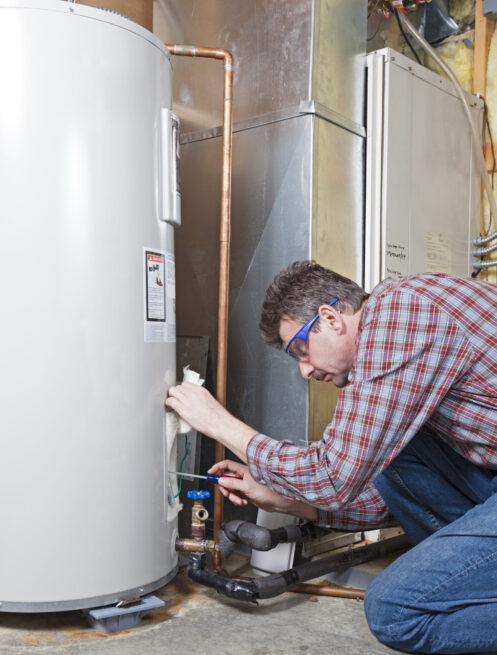
If you’re in the market for a new water heater, you can choose between tank and tankless forms. The more traditional option is the tank water heater. However, this type of water heater has many disadvantages you need to know about.
What Is a Tank Water Heater?
Thanks to its cylindrical tank, a tank water heater is easily distinguishable. This traditional water heater will vary in size depending on the total gallon capacity that your household needs. Most tank water heaters have a capacity between 30 and 120 gallons. They can be powered by electricity, natural gas, or propane and are offered for commercial and residential use.
How Does It Work?
A tank-style water heater will flow into the cylindrical storage tank until it is full. Through the use of two heating elements, the water will be heated until it reaches whatever temperature you have set on your thermostat. Safe temperatures for most water heaters fall between 120 and 180 degrees Fahrenheit.
Once the water reaches your desired temperature, the water heater will constantly monitor it. If the temperature dips below your desired setting, the heating elements will turn back on to bring your water to the set temperature. As you use hot water throughout your home, more water will enter the water heater, which will turn back on to raise its temperature.
10 Disadvantages of a Tanked Water Heater
If you’re considering a tanked water heater for your home, you need to be aware of its drawbacks. Here are 10 of them.
1. High Energy Usage
The energy efficiency of a tank water heater differs from that of a tankless one. A tank water heater constantly uses energy to maintain water in its tank to whatever temperature setting you have on. Even when you aren’t using hot water, your tank water heater will continually heat it to be ready when you need it. This isn’t environmentally friendly or energy efficient.
2. Shorter Lifespan
Another disadvantage of investing in a tank water heater is that it doesn’t have a long lifespan. Most tank-style water heaters will last from eight to 12 years. If you live in an area that has hard water, the lifespan of your tank water heater will be significantly decreased due to the sediment in the water. Compare this to a lifespan of 15 to 20 years for a tankless water heater, and it’s evident which option makes the most sense for homeowners.
3. Susceptible to Power Outages
Most tank-style water heaters homeowners use are powered solely by electricity and fairly easy to install. However, they won’t work when there’s a power outage. Unless you have a backup generator, you’re stuck with cold water until you get your electricity back.
4. Vulnerable to Gas Leaks
Although gas water heaters are no longer the preferred tank water heater, homes and commercial properties are still using them. With gas tank water heaters, a gas leak is possible. If you smell gas, you must turn off the gas valve, open your garage door, call your gas company and 911, and leave the property. Once it is safe to return, you need to hire a plumber to repair the gas line.
5. Liable to Run Out of Hot Water
One of the most significant disadvantages of a tank-style water heater is that it can run out of hot water. Depending on the capacity size of your water heater, you can only get that much hot water out of it until the water starts to get cold. In contrast, a tankless water heater can supply you with endless hot water as it’s heated and runs through your piping.
6. Takes Up Space
Bulky tank-style water heaters can take up a significant amount of space in your basement. With a tankless water heater, you can appreciate the convenient of having only a small box on your wall responsible for providing the heat you need for your water.
7. Hard to Maneuver During Installation
Another disadvantage of a tank-style water heater is that it’s difficult to move. Whether installing one from scratch or replacing your existing water heater, it can be a real pain to maneuver it into your basement. A tankless water heater simply uses a small box that is easy to move around.
8. Requires Regular Flushing
Another drawback of a tank-style water heater is that it requires regular service. At the bare minimum, you’ll need to have it flushed out at least once a year to remove excess sediment from the tank’s bottom. If you live in a region with hard water, you’ll need to have your water heater flushed more often. If you omit this ongoing maintenance, you significantly increase the risk of your water heater rusting out from inside and failing prematurely.
9. More Susceptible to Hard Water Damage
One of the downsides of having a tanked water heater is that it’s more susceptible to corrosion due to hard water. Hard water has a high concentration of minerals, particularly calcium and magnesium. When hard water gets inside your water heater’s tank, it will typically sink to the bottom, where its sediments build up. This will take a toll on the inside of your water heater and lead to unwanted corrosion. Because hard water goes through a tankless water heater relatively quickly, tankless options are less susceptible to hard water damage.
10. Requires Repairs
A tanked water heater is specifically designed with one or more anode rods. These rods are made of a metal that is more active than the steel of the tank, meaning that it reacts strongly and quickly with other elements. The anode rods collect excess sediment in the water to help reduce the risk of corrosion inside your tank. They must undergo professional replacement every three to five years. However, if you live in a region with hard water, you may need more consistent rod replacements.
All water flows through your water heater’s tank before it reaches your faucets, other plumbing fixtures, and appliances. When there is corrosion inside your tank, you can notice rust flakes in the water. And if the anode rod is exceedingly corroded, your water will have an unflattering, musty odor.
Why Tankless Water Heaters Are Better
Tankless water heaters are becoming far superior to traditional tanked water heaters for many reasons. They have a much longer lifespan, are much more efficient, supply endless amounts of hot water, and take up much less space in your home. While these systems come at a higher upfront cost, their many benefits tend to outweigh this initial downside.
Trustworthy Water Heater Service
Black-Haak offers trustworthy water heater service for the Fox Valley, WI community. We can assist with your heating, cooling, plumbing, electrical, indoor air quality, heat pump, or ductless mini split. We also provide commercial, geothermal, smart home automation, and home protection services.
Contact us at Black-Haak today to schedule your next service appointment with our friendly team.

